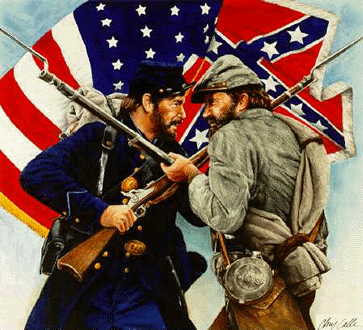I am preparing for our trip to Richmond Virginia in early March to explore the American Civil War from the point of view of eloquent first-hand witnesses, Walt Whitman (Union) and Mary Chestnut (Confederate).
My mind is attuned to material not just about the bloodiest conflict in American history, but also about why bitter divisiveness remains a way of life in the 21st century. One hopes and expects that we have learned that from complexity and diversity come life’s richness and beauty. Yet we continue to see, in many parts of the world, a polarizing demonization of “the other” as fundamentally incorrigible, inferior, or evil.
Or as American Literature professor Christopher Hanlon puts it in a recent New York Times Opinionator piece, “a certain tendency to transform political conflicts into matters of biological hostility.” In “Puritans vs. Cavaliers,” Hanlon draws on historical evidence to show how the American Civil War was once understood to have been essentially about racial incompatibility – and that was not between whites and blacks.
 During the Civil War itself, it was commonly held by both sides that biological differences and animosities between the Norman and Saxon races, dating back to the Norman invasion of 1066, had been transported across the Atlantic. The Saxons (Puritans) had settled the north and the Normans (Cavaliers) had settled the south. The sectional division and, ultimately, the War Between the States were ascribed to the inherent differences the settlers brought with them to the New World.
During the Civil War itself, it was commonly held by both sides that biological differences and animosities between the Norman and Saxon races, dating back to the Norman invasion of 1066, had been transported across the Atlantic. The Saxons (Puritans) had settled the north and the Normans (Cavaliers) had settled the south. The sectional division and, ultimately, the War Between the States were ascribed to the inherent differences the settlers brought with them to the New World.
Prof. Hanlon says, “It is by such a logic that struggles in places such as Iraq or Bosnia have sometimes appeared to American onlookers as if rooted in ‘age-old’ antagonisms, after all. By a similar way of thinking, sectional disputes over the Fugitive Slave Law, the Kansas-Nebraska Act and the Dred Scott decision once appeared to many Americans as a merely topical pretenses, under the cover of which latter-day Normans and Saxons exercised their congenital antipathies, ancient conflicts carried over the Atlantic.” You can read the entire article here.
We have a few spots remaining on our March 1-5 trip, led by Rosemary Gould of Charlottesville, VA. Come help us better understand The American Civil War and its ongoing implications.


